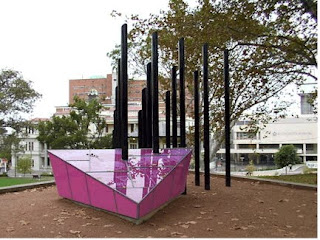
As a gay male, Bent was very emotional for me at times. The movie opens with Hollywood’s interpretation of what gay life in Germany was like before the Nazi regime: seedy nightclubs filled with gay men having sexual intercourse in the back crevasses of the clubs themselves. Max, a gay socialite, brings home a very good looking German soldier from the club, much to the dismay of his boyfriend, Rudy. The German soldier is killed by SS troops, and both of them flee to Berlin, where they meet up with Max’s uncle, who has arranged papers to get Max out of the country, but has no plan for Rudy. Max refuses to leave Rudy behind, and ultimately, they are both captured by the Gestapo and sent to concentration camps.
The Nazis used a system of pink triangles to identify homosexuals, while using yellow stars to identify those of Jewish faith. On the train to Dachau, Rudy is identified as a homosexual and is brutally beaten to death, calling out to Max one last time for help, who is of course unable to offer assistance. Max, believing that his chances for survival will be better if he is identified as a Jew, receives a yellow star. Aboard the train, Max meets Horst, a homosexual who has received a pink triangle. Among other things, he teaches Max lessons in survival, the most important being not to feel, as this is what the Nazis use to try and break down their prisoners. Ultimately, Max falls in love with Horst; however, Horst is eventually ordered upon an electric fence by a Nazi official. The movie ends with Max putting on a jacket with a pink triangle on it and throwing himself on the electric fence, committing suicide.
There are several overarching themes, including one that we discussed last week in class, that are applicable here. The theme of betrayal is especially prevalent here in a number of ways. Perhaps most clear is when all of the prisoners are being sorted with pink triangles and yellow stars. Rudy is given a pink triangle, yet Max claims he is a Jew, hoping to increase his chances for survival. This is betrayal at its most prevalent point; betraying your own identity. Victimization is of course a prevalent theme as well in this film; the Nazis, in paragraph 175, demonized and decided to go after homosexual males, comparing homosexual behavior to bestiality. It is important to note, however, that similar views against lesbian females were not advanced. Another instance of betrayal is actually present in the relationship between Max and Horst; until the very end, Max wears a yellow star, gaining the ability to work with Horst on a regular basis through bribery.
P.S. The above picture is of a Gay Holocaust memorial in Sydney, Australia.
The theme of victimization is indeed entwined with betrayal all over Bent. It is through the Nazi’s and through Max that victimization can be found. Max chose not to do anything fro Rudy on the train and Max chose not to wear the pink triangle. He victimized others by trying to put himself before anyone he loved and when the time came to speak up, he did not. When he did, by putting on Horst’s jacket with the pink triangle, it was too late. Instead all he could do was touch the electric fence and try to join Rudy and Horst in the afterlife. Max victimized Rudy and Horst because he chose not help Rudy and not to be seen as what he really was just so that he could survive. Both men loved Max, but Max did not realize that he loved them back until after both men had died.
ReplyDeleteWHat you say about Bent and the themes is okay, but you must discuss Good, the play by CP TAylor. You do not always have to reference all the secondary reading, but you always have to discuss all of the primary reading.
ReplyDeleteAnd Films
ReplyDelete